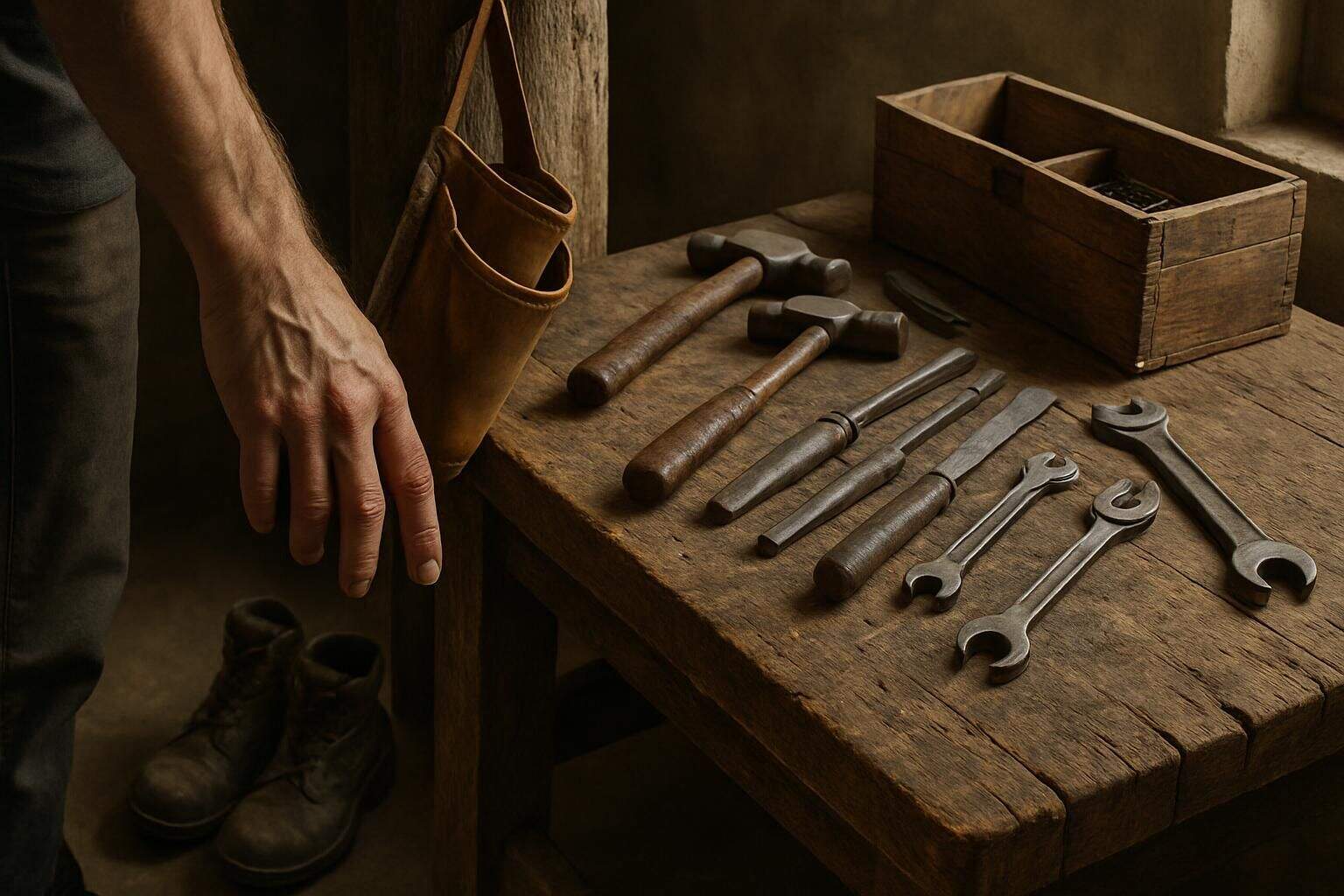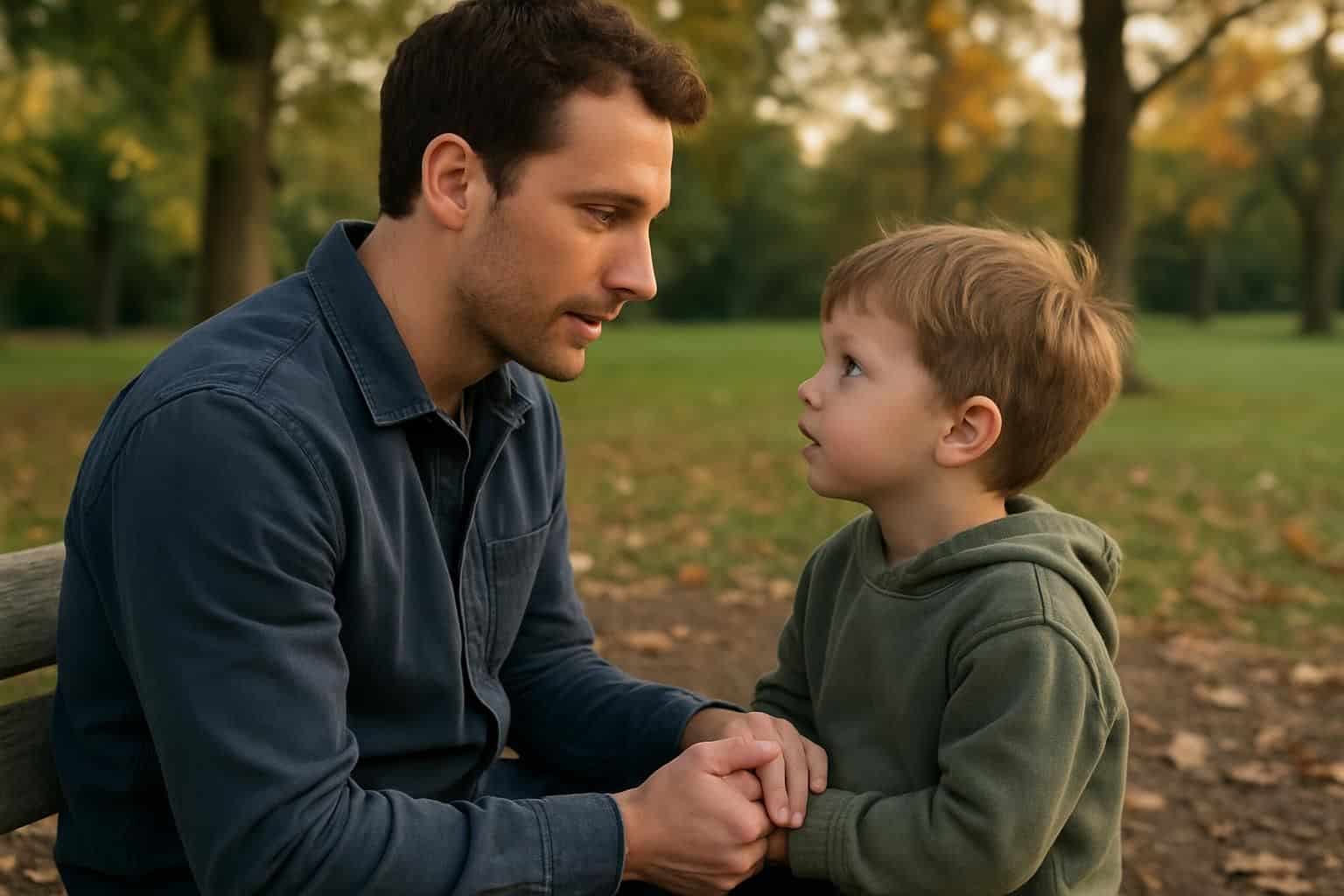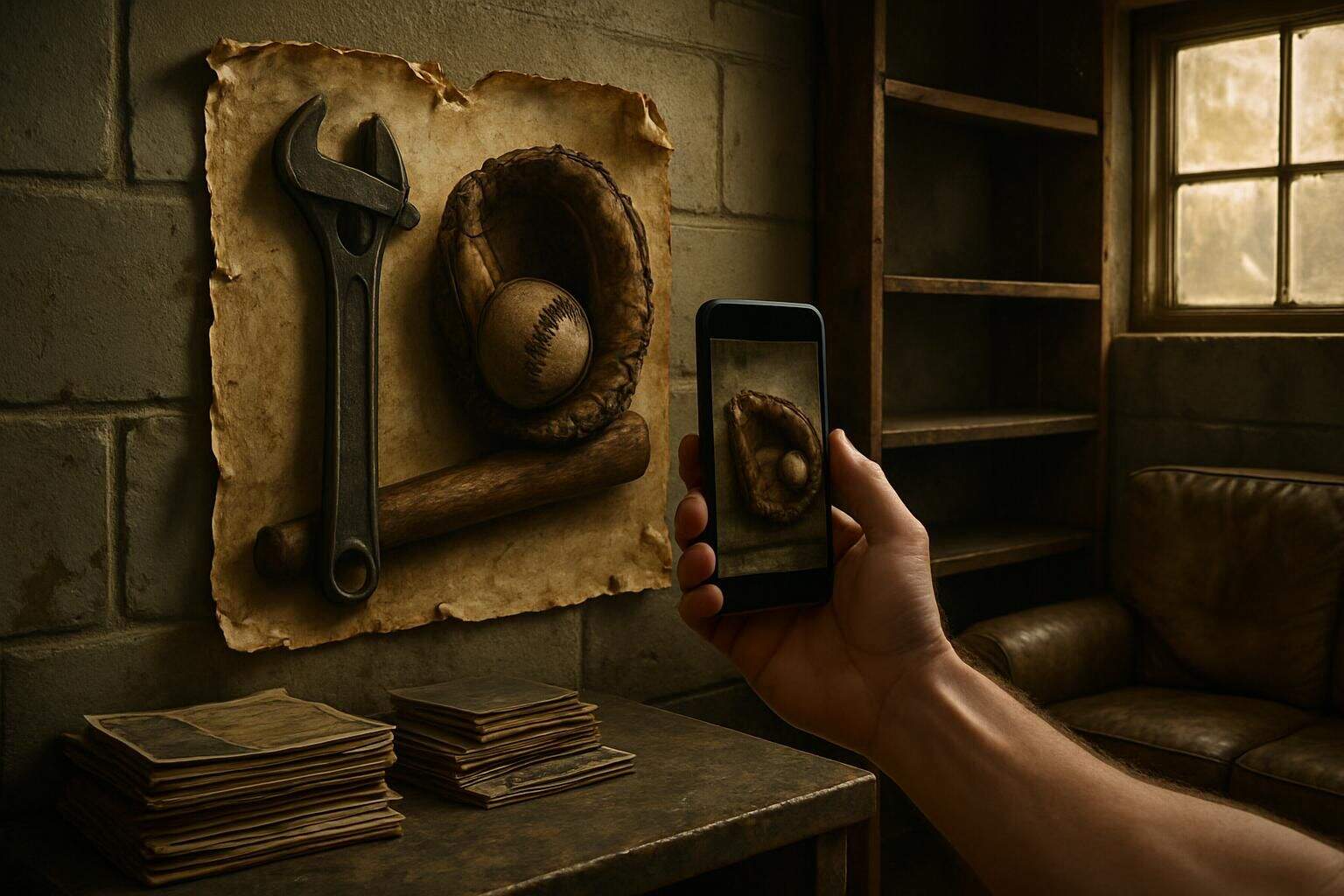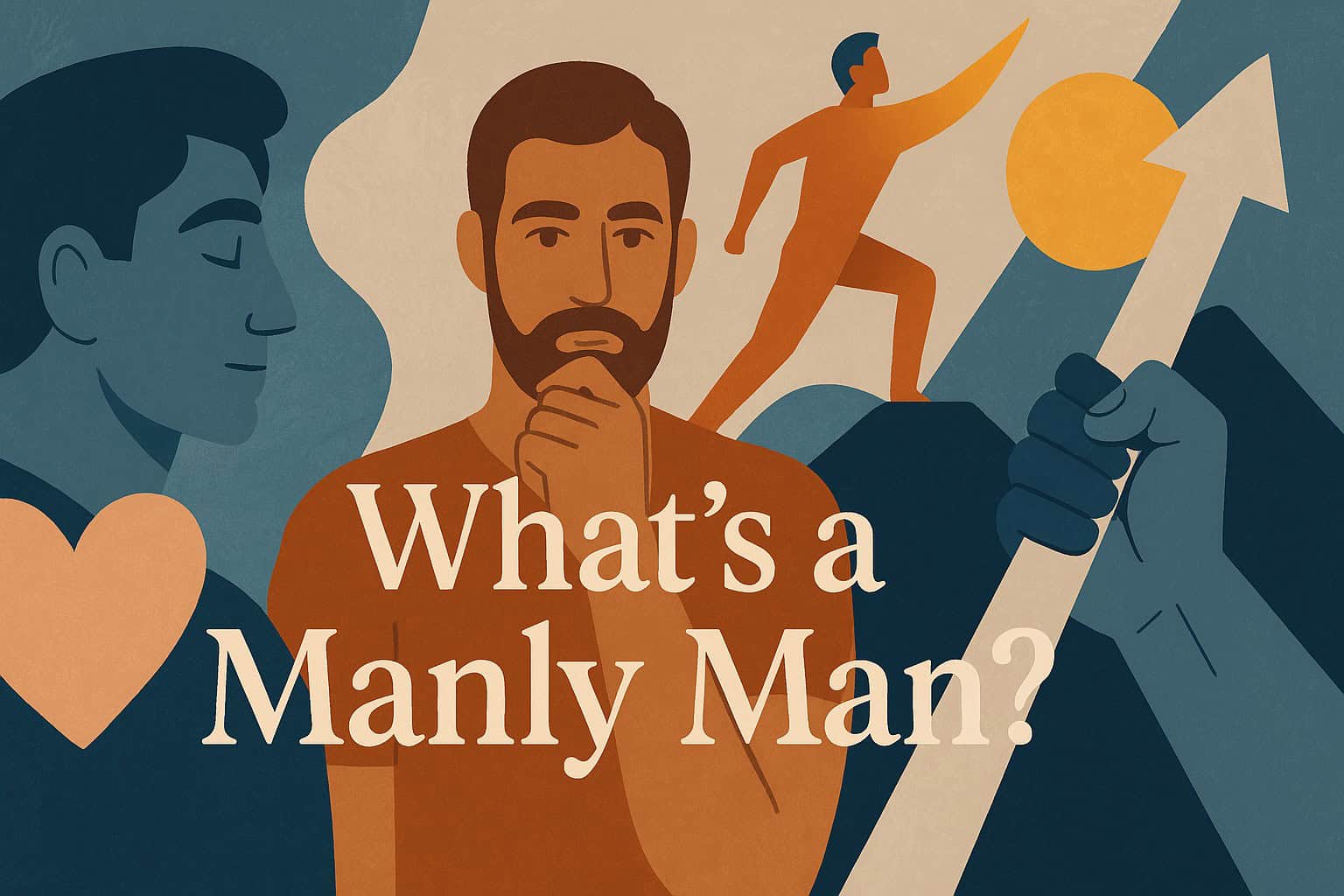Many men today wonder, “What’s a manly man?” As of 2025, masculinity is shifting from forceful traits like male dominance toward qualities like emotional intelligence and integrity.
This blog post shows you the 7 new traits that define true manliness now to boost your self-identity and social connections. Read on to discover what makes a real man in today’s changing culture.
Key Takeaways
By 2025, modern masculinity values emotional intelligence and openness along with traditional strength. Men who share emotions openly build deeper bonds and healthier relationships.
Toxic masculinity pressures men to hide feelings, leading to stress, mental issues like anxiety or depression, risky actions, and violence. Over 90% of violent crimes involve males influenced by toxic masculine stereotypes.
Historical views from ancient times to the medieval era linked manliness mainly with physical strength and dominance. Now society increasingly supports men taking care roles at home and sharing tasks equally with women.
Media often shapes ideas of manly behavior—movies typically show strong heroes (like James Bond), but social media is changing this view by allowing varied expressions through LGBT+ groups, male feminists, and mental health activists.
Real “manly” leadership today calls for integrity, accountability in daily acts, emotional honesty without shame or fear (“Courage is expressing feelings honestly”), supporting others openly rather than using control or status symbols.
Table of Contents
Defining a Manly Man

Ideas of what makes a manly man are changing along with gender norms, sexuality, and cultural views. Masculinity today is less about the rigid roles of history or biology—it’s more about being true to your identity and values.
Traditional Definition of Manliness
The traditional definition of manly includes traits like strength, courage, independence, leadership, dominance and assertiveness.
Western culture often sees a “manly man” as physically strong with tough physiques, emotionally reserved instead of sensitive or feminine. Historically—like the warriors Arminius and heroes Grendel and the dragon—masculine roles showed power through violence or military success; these gender norms shaped society’s ideas on male identity.
Manliness meant strength and bravery defined by actions more than words.
Modern Perspectives on Masculinity
While traditional views define masculinity as toughness and power, modern perspectives value emotional intelligence and openness just as much. Today, being strong does not mean you never show feelings or always act tough; expressing emotions is healthy and normal, helping men build stronger ties with others.

A masculine man can comfortably relax playing games at an online casino, then step away calmly to care for his family—he controls his mind and emotions fully.
Moreover, the LGBTQ+ community expands how we understand gender identity and roles today by expressing diverse forms of masculine traits through transgender people, transmasculine individuals, gay culture, lesbianism (butch-femme dynamics), which challenge old ideas about sex or gender roles in society.
Modern manliness supports lifting up others openly while firmly promoting gender equality in daily life.
Traits of a Manly Man

Being a manly man today means blending strength with emotional smarts, honesty with courage. True masculinity goes beyond old-school ideas — it’s deeper and more balanced than stereotypes suggest.
Strength and Courage
True strength means speaking sincerely, not staying silent or hiding feelings. Courage shows when men express emotions openly and reject toxic masculinity that praises toughness without tears.
Men who bravely show vulnerability and ally with women foster healthy relationships built on accountability, honesty, and support. Real manly men form strong bonds based on care rather than physical violence or threats to social status; supporting each other helps ease pressures like cardiovascular disease, which kills men aged 25 to 65 four times more often than women.
Courage is expressing feelings honestly instead of pretending they don’t exist.
Integrity and Honesty
Integrity means keeping your promises and owning up to mistakes without excuses. Honesty builds trust; men who tell the truth are reliable in friendships, fatherhood, and romantic relationships.
Goodness comes from daily actions, not stereotypes or gender roles. Strong men openly admit when they fail and commit to improving their behavior. Integrity requires honest reflection each day about choices made and taking clear responsibility if something goes wrong.
Leadership and Responsibility
Honesty and integrity set the stage for good leadership. In 2025, strong leaders openly show emotional intelligence, collaboration, and accountability. Real leadership means working with others to lift everyone up equally.
Instead of holding onto outdated traditional gender roles, responsible men today support gender equality by helping at home as caregivers or taking active roles in communities. Openly talking about masculinity helps challenge toxic ideas like precarious manhood, muscle dysmorphia among cisgender men, or the myth that strength demands hiding emotion; these conversations build healthier male identities over time.
Emotional Intelligence
Strong leadership needs emotional intelligence to succeed. Men with emotional smarts can express feelings like grief, joy, frustration, and love with ease. Vulnerability helps men build deep relationships and understand emotions better in friendships, family bonds, or dating situations.
Studies show low emotional understanding often leads men into unhealthy social pressures; for example, 25% of men skip needed doctor visits due to old ideas about masculinity that value toughness over health.
Emotional intelligence isn’t weak; it’s strength knowing its heart.
The Role of Masculinity in Society

Masculinity shapes culture and identity—impacting men’s mental health, gender roles, and how society views manliness today; keep reading to learn more.
Historical Context of Masculinity
Historical ideas of being a man go back thousands of years. Ancient examples include rules set by the Code of Hammurabi nearly 3,800 years ago, and stories in the Hebrew Bible highlighting male roles as leaders, warriors, and protectors.
Roman writer Tacitus praised strong warrior virtues among tribal leaders like Arminius—or his wife Thusnelda—for their courage and fortitude against Rome. Medieval chivalry followed later with knights who showed strength yet honored women through respect and protection.
These past ideals often promoted emotional restraint and stoicism as key masculine traits; men were expected to hide feelings to seem strong and brave at all times—even viewed negatively if labeled “sissy.” Many traditional notions emphasized men’s dominance (called hegemonic masculinity), maintaining control over women physically or socially.
Over time these older standards shaped names linked strongly today to tough masculinity; discover more examples on this list of manly guy names.
The Evolution of Masculinity in the Modern Era
Society’s views on masculinity shifted greatly in recent times. Masculinity in 2025 stresses emotional openness, integrity, and empathy rather than just physical strength. The feminist movement helps break down old beliefs like “real men don’t cry,” lifting social stigma around men showing vulnerability or emotion.
LGBTQ+ communities also shape this modern idea of masculinity, promoting more fluid gender expression and acceptance beyond traditional stereotypes surrounding sexual orientation or gay sexuality.
Men today often practice collaborative leadership at home and in workplaces by sharing responsibilities evenly with women. They focus on building healthy relationships instead of proving dominance through physical prowess or status symbols.
Being manly now means supporting gender justice; it involves acting as allies to end oppression of women and standing against toxic masculine traits that hurt mental health such as alcoholism, unsafe sex behaviors, gender-role stress issues, or isolation linked to heart disease risk.
Real strength means being honest about your feelings.
The Influence of Culture on Masculine Ideals
Modern culture reshapes masculine ideals through changes in gender roles, media portrayals, and mental health awareness. Men today see diverse masculinities shaped by ethnic backgrounds, sexual orientations, and movements like feminism and pro-feminism.
Media often uses stereotypes to define manly men as emotionless or overly competitive. Men’s rights activists criticize these negative portrayals for creating harmful ideas that lead to toxic masculinity; yet now society embraces healthy expressions of male identity across LGBT cultures, trans men’s experiences, gay-rights movements, and more openness toward emotional health issues such as depression or eating disorders.
Common Misconceptions About Manliness

Plenty of men still think emotions make them weak—a myth that leads straight to toxic masculinity. Society often mistakes toughness as the only path to strength, ignoring how emotional skills help build true manliness.
Toxic Masculinity vs. Healthy Masculinity
Toxic masculinity promotes aggression, dominance, and hiding emotions. It pressures men to act tough, avoid vulnerability, and rely on hyper-independence instead of seeking help. Men trapped in toxic masculinity often suffer poor mental health such as anxiety or depression; studies show over 90% of violent crimes are committed by males influenced by it—a tragic disgrace to manhood.
Healthy masculinity encourages emotional intelligence, open expression, and seeks support for mental well-being without shame. Traits like integrity, courage in sharing feelings openly with friends or family members, building empathy through communication skills—all these build stronger relationships and healthier societies.
Masculinity is not about how much you can lift but how bravely you confront life’s challenges—with honesty and heart.
The Myth of Emotionless Strength
Many men learn from childhood to hide emotions like fear, pain, or sadness. Society often expects toughness and silence during hard times; crying or complaining gets wrongly labeled as weakness.
This idea creates the “Myth of Emotionless Strength,” where real strength supposedly means being stoic and never showing feelings publicly. Suppressing emotions harms men’s mental health and emotional well-being over time; it can lead to stress, anxiety, depression, even problems with alcohol abuse or risky sexual behaviors like unprotected sex.
Healthy masculinity rejects this harmful belief by teaching men emotional intelligence: recognizing feelings openly, expressing them honestly, and handling them responsibly.
How to Be a Manly Man in Today’s World

To thrive today, a man builds genuine bonds and contributes meaningfully to his local community. He learns to embrace openness as core strength rather than weakness.
Embracing Vulnerability
Lewis Howes says that vulnerability helps men create strong and healthy relationships. Emotional struggles are normal human experiences, yet cultural pressures teach many men to hide these feelings to appear traditionally masculine or tough.
Effective leadership requires emotional intelligence; openly expressing emotions makes you a better leader, friend, and partner. By embracing emotional vulnerability, you support others going through similar feelings and build genuine connections based on honesty rather than stereotypes of emotionless strength.
Building Strong Relationships
Strong relationships depend on clear communication and active emotional engagement. Partners value men who speak openly, respond with empathy, and face relationship challenges with courage.
Show reliability by keeping promises daily; trustworthiness grows through honesty and integrity in every action. Responsibility is a masculine trait admired by partners; it includes supporting your partner emotionally, helping at home, or caring for children as involved fathers do today.
Good relationships also require understanding gender performances without gender policing or letting toxic masculinity block vulnerability.
A healthy bond means knowing emotions strengthen—not weaken—you as a manly man. Let go of outdated stereotypes that claim strength lies in being emotionless or distant like some portrayals of traditional masculinity found in men’s movements or media images from movies to social media platforms like Instagram or Facebook.
Instead, proudly embrace emotional intelligence as essential for building connections within the LGBT community or straight partnerships alike—leading naturally into contributing meaningfully to your local community’s well-being next.
Contributing to Your Community
Building strong relationships goes beyond your inner circle and extends to the community around you. Manly men lead by example through acts of service, kindness, and integrity in their local area.
This might mean volunteering once a week at food banks or shelters for the homeless. It can also be coaching youth sports teams or joining groups that support men’s mental health and emotional well-being.
Rejecting toxic masculinity means lifting others up without expecting anything back; it involves showing empathy openly, mentoring younger members needing guidance, and being honest about personal struggles to build trust with neighbors.
Serving your community actively creates a positive mindset among peers while breaking stereotypes about emotionless strength often promoted by some media portrayals of gay men and men’s-rights activists.
The Five Maxims of Being a Manly Man

These five maxims guide men in balancing strength with empathy, and confidence with connection. They offer clear values to steer through today’s changing ideas of masculinity.
Manly Men Do Manly Things
Manly men act with purpose, courage, and responsibility. They protect others by opening doors for women, mentoring younger men in healthy masculinity, or standing up against toxic masculinity that’s often portrayed in movies and advertising.
A manly man takes action; he does not wait or hesitate to tend his field of duties at home, family life, work tasks, and community roles. Living to the glory of God drives many such actions today; events like “Super Saturday” teach biblical masculinity rooted in integrity and strength.
Next is understanding how a man tends his field carefully each day.
Manly Men Tend Their Fields
A young man’s field starts small. It begins with self-care like daily hygiene, clean clothing, and owning his actions; it grows step by step from there. Keeping your space tidy, paying bills on time, or sticking to your word helps your field flourish.
Each action builds trust and shows integrity and honesty. Taking care of family members, supporting partners emotionally, or serving communities also counts as tending fields—these make you a positive force in society.
True manhood has boldness and principle but also expresses passion through careful acts like listening closely in conversations or offering comfort when needed. Understanding emotional intelligence matters just as much as physical strength for masculinity today; caring boldly makes men stronger rather than weaker.
The focus remains clear: consistently handle responsibilities at home first before expanding outward toward friends and local groups where support can influence even more lives positively each day.
Manly Men Build Other Men
Manly men help other men grow stronger by offering guidance and clear examples. Stephen Mansfield highlights mentorship from older to younger men, focusing on duties and actions over feelings.
Nationwide events like Super Saturday gather men together, promoting strong bonds and teaching essential skills in responsibility. FamilyLife Today also offers helpful resources for personal growth through community events that strengthen emotional intelligence and integrity.
Building other men means sharing knowledge, giving honest support about tough topics like mental health or gender-role stress, and standing firm against false ideas of emotionless strength or toxic masculinity.
Manly Men Live With Purpose
Living with purpose defines masculinity. Author Stephen Mansfield, writer of “Mansfield’s Book of Manly Men,” urges men to rediscover their essential masculine selves through meaningful responsibilities.
True masculinity aims to glorify God and honor divine purpose daily in family life, workplace leadership, or community roles. Genuine manliness does not center on sexual prowess, physical attractiveness, or stereotypically tough behaviors portrayed often by movies and social media; instead, it emphasizes contributing positively to your community and household.
Responsible actions guide identity more than outdated ideas like gender stereotypes from traditional male socializations promoted historically by certain cultures or second-wave feminists’ criticisms of toxic masculinity.
Manly Men Stay Resilient
Manly men stay resilient by facing life’s challenges head-on. Stephen Mansfield, who teaches about godly masculinity, stresses persistence during hard times and staying strong under pressure.
I saw true manliness watching friends overcome issues like gender-role stress and mental health struggles without falling into victimhood or passivity. Instead of blaming culture or media for hardships or changes in masculine ideals, these men learned to adjust, grow their skills, and become steady leaders for family and peers.
Dennis Rainey points out real strength means accepting your limits honestly; pretending you’re perfect won’t help build resilience. Emotionless toughness is a myth that denies the truth of human nature; instead genuine integrity faces hurt openly yet stands firm over time.
Strong relationships with trusted mentors provide guidance through difficult seasons so you can lead responsibly within your community to support other people around you as well.
The Impact of Media and Society on Masculinity

Social media and movies shape how men think about masculinity—often spreading stereotypes of tough guys or emotionless leaders. Ads and popular culture push ideas that can pressure men to act in ways that harm mental health, identity, and relationships.
Masculinity in Movies and Advertising
Movies and ads often show men as strong, tough, stoic, and dominant. Action films like the James Bond series or Marvel movies typically present heroes with these masculine traits. Modern directors now challenge these ideas by creating complex male characters who express a wide range of feelings.
Comedies also question traditional masculinity norms through humor; dramas depict men struggling with roles linked to biological sex and gender studies concepts like queer identity or male homosexuality.
Western portrayals of masculine ideals have appeared in countries such as China and India as global media spreads.
Film creators increasingly reject old stereotypes by crafting roles that encourage emotional openness along with strength and courage. Actors today often choose scripts that highlight empathy rather than emotionless toughness so common before the 2000s era of cinema dominated by action stars like Arnold Schwarzenegger or Sylvester Stallone.
Movie genres across drama, comedy, even blockbuster superhero franchises now showcase deeper male identities instead of simple power displays seen in older commercial hits. Social media platforms further shape expectations about masculinity among younger generations worldwide.
Next we’ll look at how social media impacts modern views on what it means to be a manly man today.
Social Media’s Role in Shaping Masculine Expectations
While movies and ads shape masculine ideals, social media deeply impacts men’s views too. Platforms like Instagram, TikTok, and Twitter now spotlight varied expressions of masculinity through activists, male feminists, and mental health advocates.
Yet men who post often risk facing the “frequent-posting femininity stereotype,” where active sharing makes people see them as feminine or not strong enough. Advocacy groups on social media openly challenge old-fashioned views about toxic masculinity by pushing for healthier ideas around strength, empathy, and emotional openness; this helps many men build stronger identities and better self-worth.
Challenges Faced by Modern Men

Many guys today struggle to balance old ideas with new social expectations—leading to confusion and stress. Gender-role pressures can affect mental health, personal growth, and relationships in men’s daily lives.
Gender-Role Stress
Men can feel gender-role stress if they act in ways seen as feminine, like openly sharing their feelings or seeking emotional help. Studies show men often rely on women for support while hiding emotions from other men to keep up tough masculine roles.
Negative responses when reaching out to male friends may push men into social isolation and mental health issues, increasing anxiety or depression risks. Research confirms that rigid masculinity norms taught through media portrayals in regions like India, Turkey, and East Asia also add pressure on younger men’s behaviors.
Balancing Traditional and Modern Masculinity
Gender-role stress often comes from tension between traditional and modern views of masculinity. Men today face pressure to prove their strength, while also feeling free to show empathy, vulnerability, and openness.
Traditional ideas about manly men focused on courage, toughness, and holding back emotion. Modern masculine traits now include emotional intelligence, honesty about feelings, and working well with others.
Positive masculinity blends the best parts of these new values with classic ideas; it encourages individuals to express themselves freely beyond old stereotypes. Ethnicity, sexuality—including experiences from trans women or homosexual men—and economic background shape how each man navigates this balance in everyday life.
The Psychology of Masculinity

Male identity runs deep—shaped by society, culture, and personal experiences. Getting a handle on this can boost mental health and build better connections with others.
Understanding Male Identity
Men form identity from ideas taught early in life, shaped by things we see and hear. Historically, masculinity emphasized physical toughness, bravery, and limited emotional expression; men were molded into protectors or providers.
Today in 2025 the meaning of being a manly man shifts toward healthier views on strength and courage that welcome emotions and empathy. Traits like vulnerability help men’s mental health; they also build honest bonds with other men through support groups, sports teams, communities addressing toxic masculinity issues openly.
Modern masculine ideals don’t mean giving up physical strengths or ambition but adding depth through compassion and social connection for balanced lives as fathers, partners, or friends.
Mental Health and Emotional Well-Being
Traditional masculinity stigmatizes vulnerability, which isolates men facing mental health struggles. Modern manly men see emotional expression as strength, not weakness. Over-exercising to get muscular physiques leads male athletes into body dysmorphic disorders and hurts their emotional well-being.
Support groups and online platforms offer safe spaces for men to share openly about anxiety or depression. Redefining what it means to be a manly man includes openness about feelings, improving both relationships and overall wellness.
Good mental health also helps build stronger bonds in families, friendships, and communities.
Social connectedness holds great power in shaping male identity today. Online communities discuss issues like toxic masculinity versus healthy masculinity openly; they change old beliefs on isolation and silence around men’s mental health problems that leave many feeling lost or ashamed.
Facing these outdated gender-role stresses head-on allows modern masculine traits—integrity, empathy—to shine brighter in everyday life situations at work or home. Healthy self-awareness can lead directly into deeper connections with others—a key step toward becoming the kind of strong yet open-hearted leaders society needs now more than ever before.
Moving ahead requires understanding how social connectedness affects a man’s daily interactions with family members and coworkers alike under “The Importance of Social Connectedness.
The Importance of Social Connectedness
Social connectedness strongly affects men’s mental health and emotional well-being. Research shows that strong social ties can sharply reduce depression, curb suicidal behavior, and improve overall happiness in men.
Yet many men struggle to seek emotional support or share feelings openly. Often, they rely solely on women for emotional connections while keeping a tough front around other men due to traditional masculine norms.
To break free from harmful patterns tied to toxic masculinity, men need safe spaces such as support groups or online forums where they can express vulnerability without judgment. Challenging these outdated beliefs helps form deeper friendships, stronger communities, and healthier minds; this openness reshapes today’s picture of what it means to be a manly man.
Next up: Fatherhood and Masculinity
Fatherhood and Masculinity

Fatherhood shapes how men see themselves and pass on ideas about manliness to their kids—so keep reading for more.
The Role of Fathers in Defining Manliness
Fathers shape a child’s view of manly traits early in life. From young ages, boys often hear phrases like “Don’t be a wuss,” teaching toughness and pushing emotional strength as core masculine ideals.
Studies show fathers who display traditional masculinity, such as bravery, integrity, and emotional control without openness to feelings, have less close ties with their children later in life.
Newer views on being manly value sensitivity and emotional openness instead; these qualities boost adult children’s happiness in relationships. Fathers who model courage along with empathy build stronger bonds; this balance defines healthy masculinity today.
Lessons Passed Down Through Generations
My grandfather showed tough love, but he hugged us often; it taught me strength could be soft. Research from 2022 found dads who were nurturing had stronger bonds with their kids. Many fathers struggle to balance traditional male roles and new fatherhood ideals, yet being empathic helps them connect better.
Men raised by caring dads tend to believe they should also show care openly, improving emotional health in families across generations.
Criticisms and Debates Around Masculinity

Debates continue around the idea of a masculinity crisis, gender roles, and efforts for equal rights—read on to dig deeper into this hot topic.
The Concept of Masculinity in Crisis
Sociologists state masculinity faces ongoing crisis from clashes between equality and patriarchy. This conflict has increased due to shifts in labor markets and gender roles, challenging traditional masculine traits like strength, emotional control, and leadership.
More men today report higher levels of gender-role stress and anxiety related to balancing traditional manliness ideals with modern expectations of emotional intelligence, vulnerability, and equal partnerships.
Cultural changes have caused more researchers to explore the concept of masculinities in sociology; Judith Butler argues that ideas about manly men are often social constructions rather than natural facts.
Efforts Toward Gender Equality
Men play an important role in gender equality by becoming active allies. Reject toxic masculinity, highlight empathy, and build emotional intelligence to foster inclusive settings.
Self-awareness of men’s privilege helps create fairness and respect between genders. Taking on caregiving tasks at home, speaking out against harmful stereotypes—like the portrayal of gay men or compulsory heterosexuality—and backing the women’s movement make a real difference in promoting change.
Common efforts like open talk about gender roles, fair treatment of sex workers in the commercial sex industry, and valuing female athletes as equals further strengthen men’s support for equal rights over time.
How Will Masculinity Evolve in 2025?

Masculinity will shift clearly in 2025 to traits like emotional intelligence, kindness, and vulnerability. Men will build masculinity through caregiving roles at home, open communication with family members, empathy for others’ needs, and collaboration rather than competition.
The LGBTQ+ community—including examples from lesbian culture—will expand what it means to be masculine beyond gender stereotypes or the myth of emotionless strength. Manly men will understand social constructions of gender difference and openly support women; they will use their privilege to speak up for gender equality in society.
People Also Ask
What masculine traits define manly men in 2025?
Traits like openness about sexual health, comfort with female masculinity, and understanding the social construction of gender difference redefine today’s manly men.
How does nature versus nurture affect modern views on masculinity?
Nature sets some basic traits, but nurture shapes how society sees a “manly” or “woman-like” adjective or adverb; this impacts our ideas about gender roles today.
Why is the female athlete paradox important when discussing masculinity?
The female athlete paradox shows women can have strong masculine traits without offense; it proves that being athletic isn’t just for males anymore.
Do lesbians influence current definitions of masculinity?
Yes, lesbians who come out of the closet openly display forms of female masculinity; their visibility helps transition traditional views into broader acceptance.
Can an alcoholic still be considered a manly man by new standards?
Being an alcoholic doesn’t remove someone’s masculine identity; however, redefining what makes someone truly “manliest,” as a superlative term, means valuing healthy choices over harmful habits to avoid vested interest in outdated stereotypes from women’s history.
References
https://en.wikipedia.org/wiki/Masculinity
https://www.npr.org/2023/03/15/1163667777/gender-what-is-masculinity-manhood (2023-03-16)
https://geediting.com/7-qualities-of-a-truly-good-man-even-if-he-isnt-perfect/ (2025-02-24)
https://www.rockandart.org/evolution-masculinity-male-identity-world/
https://greenhillrecovery.com/toxic-masculinity-vs-healthy-masculinity/
https://medium.com/father-co/who-gets-to-define-masculinity-a-look-beyond-the-buzzwords-9f7e900e90ec
https://www.psychologytoday.com/us/blog/how-be-yourself/201712/embracing-masculine-vulnerability-qa-lewis-howes (2017-12-15)
https://www.marriage.com/advice/relationship/masculinity-characteristics/
https://www.psychologytoday.com/us/blog/a-marriage-of-equals/202501/men-what-value-does-masculinity-hold-for-you (2025-01-24)
https://www.familylife.com/podcast/familylife-today/mansfields-manly-maxims/
https://blog.thegentsplace.com/manly-men/
https://www.impactus.org/articles/5-maxims-of-being-a-manly-man/ (2021-02-23)
https://sobrief.com/books/mansfields-book-of-manly-men (2025-05-13)
https://www.amazon.com/Mansfields-Book-Manly-Men-Invigorating/dp/1595553738
https://udayton.edu/blogs/momentum/2024/01/edelblum-social-media-and-masculinity.php
https://academic.oup.com/edited-volume/28156/chapter/212974915
https://individualcareoftx.com/2024/06/15/redefining-masculinity-in-mental-health/ (2024-06-15)
https://pmc.ncbi.nlm.nih.gov/articles/PMC6142169/
https://blogs.belmont.edu/communications/2021/09/16/be-a-man-how-masculinity-affects-fatherhood/ (2021-09-16)

